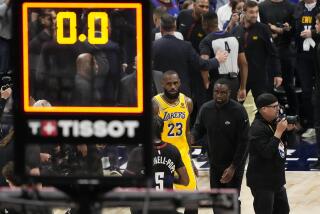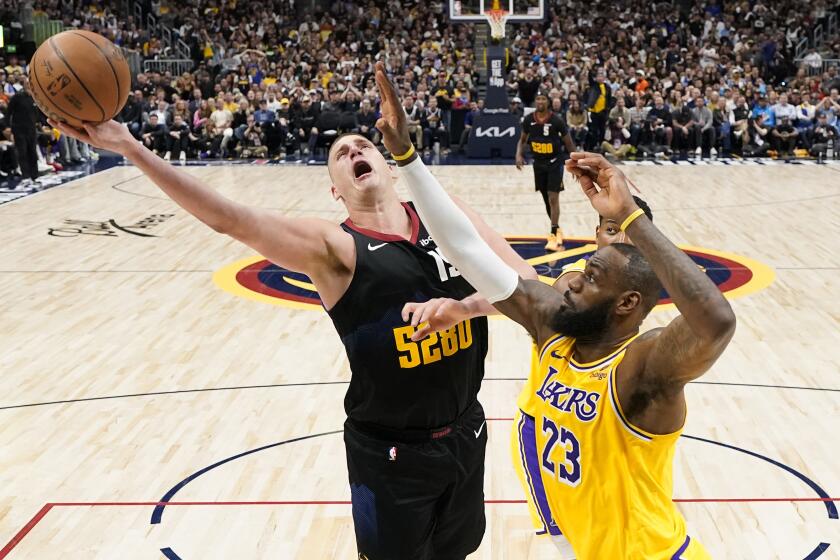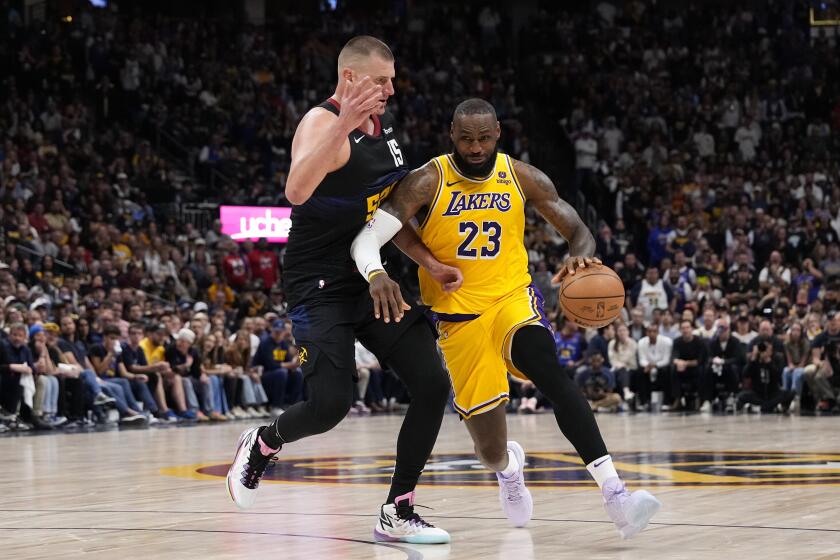Signs in Bryant Statement Point to Deal in Works
With the dismissal of criminal charges, the Kobe Bryant case now appears headed for a familiar ending -- allegations against a celebrity that close with a negotiation, not a verdict.
The case showed again why sexual assault cases are among the most difficult to prosecute, legal experts said Wednesday.
In the apology that his lawyers released after Dist. Atty. Mark Hurlbert of Eagle County, Colo., dropped the charges against him, Bryant insisted that “no money has been paid” to the woman who accused him. But that may mean only that no money has been paid yet, said lawyers familiar with the sometimes delicate negotiations in such cases.
“A plaintiff cannot go to a defendant and say, ‘If you pay me, I will drop the charges.’ There can’t be an explicit deal, but there may be an implicit one,” said Harvard Law School criminal law expert Alan Dershowitz. No deal could prevent the woman from testifying in a future case, he and other legal experts said.
Several aspects of Wednesday’s statement indicated to legal experts that a deal was in the works between Bryant and his accuser, who recently filed a civil suit against him in federal court:
* Bryant’s acknowledgment that “I now understand how [the alleged victim] sincerely feels that she did not consent to this encounter.”
* The carefully worded sentence saying the apology itself “will not be used against me in the civil case.”
* The basketball star’s final statement that the civil case would be “decided by and between the parties directly involved in the incident.”
“We are now involved in a very complicated game of chess,” Dershowitz said. “It clearly is a negotiated statement. Not a word of that was written by Kobe. You can see the lawyers’ hands all over that. It is very artfully done.”
Bryant would hardly be the first celebrity to make a financial settlement with someone who accused him of a crime. Michael Jackson agreed to pay $15.3 million to a boy he was accused of molesting in 1993, according to a confidential settlement that eventually became public. The boy never testified against Jackson.
Indeed, sexual assault cases involving high-profile defendants may be particularly susceptible to ending that way. Almost always dependent on a jury’s willingness to believe an alleged victim, sexual assault prosecutions are unusually vulnerable to attacks on that person’s credibility and to a last-minute decision to resist testifying.
“These cases are always tough, whether they are celebrity cases or not,” said Myrna Raeder, a law professor at Southwestern University School of Law in Los Angeles and an expert in evidence. “When you add in the celebrity, they become near impossible.”
The degree to which rape prosecutions hang on the accuser’s credibility is one reason “the conviction rates for rape are significantly lower on average than for other sorts of crimes,” said Andrew Taslitz, a Howard University law professor who has written a book about rape and the criminal justice system.
The point at which the Bryant case fell apart -- with jury selection underway -- is precisely when a deal is most likely to be struck, according to lawyers with experience in such cases.
The dropping of the charges “shows the obvious, that prosecutors knew that they had problems with the case and that Kobe Bryant knew there were risks to his going to jail,” said Loyola Law School professor Laurie Levenson. “It is a very dramatic moment when you start picking a jury and realize how real this could be.”
Michelle J. Anderson, a law professor and expert on rape at the Villanova University School of Law, said: “We’re at the eve of trial right now, and the pressure is at the highest point for someone who is anticipating being destroyed on cross-examination. Her sexual history would be put on trial, and she is trying to protect herself from that.”
Bryant’s lawyers have alleged that the woman had sex with someone else soon after the alleged rape. She has denied that.
Lawyers said prosecutors had little choice but to drop the case after the 20-year-old woman made clear that she was unwilling to testify.
Although prosecutors could have subpoenaed her and threatened her with legal sanctions, they would not have been able to prove the case with an unwilling victim, said former U.S. Atty. Joseph Russoniello, now dean of the San Francisco Law School.
Going forward without an accuser would also have been difficult because the main issue in the case was consent. “If she doesn’t want to testify, what do you have?” Raeder asked.
The criminal case against Bryant had already been weakened by the accuser’s filing of the civil lawsuit, which defense lawyers could argue had created a potential financial motive for her testimony.
Even without such hurdles for the prosecution, rape is difficult to prove to juries.
Jurors, including women, tend to be skeptical of rape victims, and often there are no physical injuries, Taslitz said. In this case, evidence of physical injury was ambiguous.
Under pressure from women’s rights advocates, states have tried in recent years to boost the number of rape convictions by adding protections for alleged victims of sexual assaults. But the main effort -- rape shield laws that limit how much an alleged victim can be questioned about her sexual history -- have largely failed to boost convictions or reporting rates.
“There is no prosecutor who can guarantee that a woman’s sexual history will not be admissible” as evidence in court, Raeder said.
Colorado’s shield law is considered relatively weak, although other aspects of the state’s sexual assault laws are unfavorable to defendants. But even in states with more prosecutor-friendly shield laws, courts have whittled away at the protections for alleged victims.
Defense lawyers say that is entirely appropriate. Doing more, they say, would make fair criminal trials impossible.
Indeed, some blame Bryant’s prosecutors for inviting scrutiny of the accuser’s sexual activities. By presenting evidence of physical injuries, including bruising, the prosecution permitted the defense to counter with evidence that someone else had caused the bruising.
No shield law would have prevented defense lawyers from presenting that evidence to a jury. But supporters of rape shield laws faulted Colorado District Judge Terry Ruckriegle, who presided over the case, for going further.
Ruckriegle let the defense argue that the woman’s sexual activities after the encounter with Bryant were inconsistent with those of a rape victim.
In dismissing the case Wednesday, Ruckriegle lamented that many questions about what happened in Bryant’s hotel room might not be answered.
“It will, of course, always leave a question in the minds of everyone,” the judge said. “Several jurors have stated that only two people know what happened.”
By contrast to the criminal case, the civil suit in U.S. court gives the woman protection under the federal rape shield law, which Anderson said was often viewed as the most favorable to accusers of any in the nation.
That is one of several factors that could spur negotiations to settle the civil case quickly. If there is no settlement, the accuser will have a chance to renew the argument about how much evidence of her sexual history can be presented to the jury, Anderson said. The accuser could “potentially get a more carefully limited ruling” that would keep the defense from presenting as much evidence about her personal life, Anderson said.
Moreover, in a civil case, the alleged victim could also require Bryant to testify under oath in a deposition in which he could be asked detailed questions about his own sexual history. He could not have been forced to testify in a criminal case.
“The high-profile, celebrity nature” of the case and the gap between Bryant’s resources and those of a small district attorney’s office “made this case the poster child for the worst way we can treat a victim in a sexual assault case,” said Cynthia Stone of the Colorado Coalition Against Sexual Assault.
“The fortunate thing about our country is that if the criminal case doesn’t work out, there is a perfectly legitimate alternative,” she said.
Times staff writers Anna Gorman and Lance Pugmire contributed to this report.
More to Read
All things Lakers, all the time.
Get all the Lakers news you need in Dan Woike's weekly newsletter.
You may occasionally receive promotional content from the Los Angeles Times.







